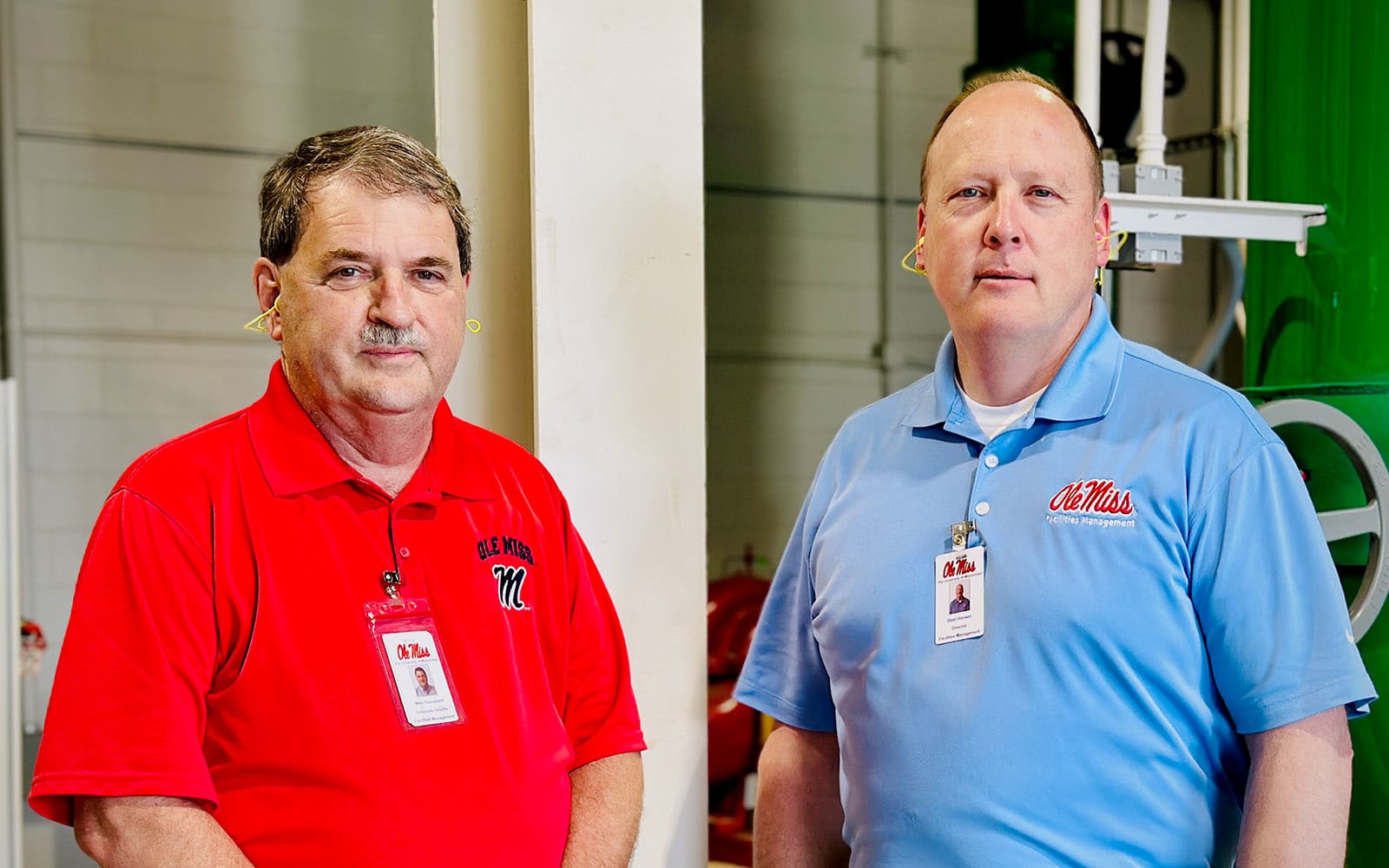|
Getting your Trinity Audio player ready...
|
When Dean Hansen and Mike Dunnavant came to the facilities department at the University of Mississippi (Ole Miss), the opportunities for transformation were plentiful. Work orders were still being issued via paper. Preventative maintenance lacked coordination. The department also didn’t have electronic management systems in place, which made it difficult to organize spending, building conditions, and inventory data.
Ole Miss by the Numbers
- 23,780 students
- 460 student organizations
- 190 undergraduate programs
- 65% graduation rate
- 97% acceptance rate
- 3,497-acre campus
- 220 major buildings
- 16:1 student to faculty ratio
Faced with those hurdles, Hansen, who came to the university to serve as director of facilities management in 2018, knew it would be an uphill battle. “We were starting from scratch,” Hansen says. “It would be a long process and a lot would need to happen behind the scenes to help the organization jump to a higher level.”
Dunnavant, who joined as associate director of facilities operations a year later, drew a similar conclusion. “I was surprised by the lack of technology when I first got here,” Dunnavant says. “We almost had to start from ground zero to rebuild the whole department and to change the ‘this is the way we’ve always done it’ kind of thinking.”

Both leaders stepped into their roles and used the opportunities as fuel. Within his first six months on the job, Hansen evaluated the needs and charted a vision for the department, one that would be more efficient, modern, and better managed. Dunnavant hit the ground running too. While Hansen focused on the department’s strategic issues and opportunities, Dunnavant worked to transform day-to-day operations and processes.
Fast forward four years and the fruits of their labor are starting to ripen. Recently, the department entered into a contract with an integrated workplace management system provider that will help the team manage basic inventory items, preventive maintenance actions, condition assessments, and more. Dunnavant says it will be a game changer.

“This coming fiscal year will be extremely transformational because of that system,” he says. “When we get things up and running and implemented, it’ll make the jobs of our technicians much easier while also giving us data that will allow us to make things more efficient and faster.”
The department’s partnership with Trane, an energy services company (ESCO), has been just as impactful. The company has worked closely with facilities staff to implement an energy savings program to optimize energy usage in campus buildings. So far, projects that have come out of that partnership include the installation of direct digital control systems and LED lighting upgrades campuswide. Other strides to come include optimizing the campus’ chill water loop, performing LED lighting upgrades, and completing construction on a new mechanical plant.
Advertisement
Beyond bringing engineering knowledge and expertise to campus and the facilities department, Trane has also presented new opportunities to university students. It sponsored senior capstone projects, contests, internships, and hired former student interns. With decades of facilities experience under his belt, Hansen says that he has never experienced an ESCO partner as committed as Trane.

“Trane has been much more than a transactional partner and really an asset to our department, helping us identify problems and solutions [and] providing technical training and support to our staff while investing in our students. The relationship we have goes further than anything else I’ve seen in my career,” Hansen says.
For Nancy McBee, the Ole Miss team lead at Trane Technologies, that feeling is mutual. “The University of Mississippi is an amazingly special client to me—like none I have ever been involved with before,” she says. “The facilities management team treats us as an extension of their organization, and that is exactly how we see ourselves. Within Trane, I insist that going above and beyond for Ole Miss is the expectation not the exception.”
The department’s tech stack, processes, and partnerships haven’t been the only subject of transformation during Hansen and Dunnavant’s tenure. So has departmental culture, a process that has required listening, transparent communication, and what Hansen describes as “following through on what we say we are going to do.”
“We inherited an organization that had a culture of distrust of management,” Hansen says. “A lot of our staff have seen how painful our processes have been and have been anxious for a change for a long time. Mike and I have worked hard to listen to our team, address their issues, and really build that trust. They’re starting to believe that we mean what we say and we’re really trying to improve the overall organization.”

Now that the transformation efforts are in full swing, both leaders have no shortage of things to look forward to. Hansen likens their journey to water skiing.
“When a water skier is trying to pop up out of the water with their skis up in the air, it’s hard to hold on at first,” he says. “But eventually the water starts plaining, and you can really start moving. I feel like right we’re right at that threshold. We’re still plowing the water but we’re starting to pop up, so I’m looking forward to getting our technology solutions and our other processes on board and getting us skiing on smooth water.”
Upchurch Companies has been pleased to be a part of the energy performance upgrades for the University of Mississippi and Dean Hansen. With the ability and the expertise to fully support our client’s mechanical, electrical, and plumbing needs, we have enjoyed being a part of this great project for such a great university, facility management team, and Trane. Upchurch has been serving SEC country since 1970 and is looking forward to continued growth throughout the region.
Trane® – by Trane Technologies, a global climate innovator, is proud to support the University of Mississippi. For over 50 years, we have been helping Ole Miss light the way for others by creating indoor learning environments that are comfortable, sustainable, and energy efficient. We accomplish this by developing a deep understanding of the campus’ needs and goals and implementing thoughtful, rightsized solutions using a broad array of industry-leading building equipment and controls, technologies, and services. Like the University of Mississippi, we believe in the power of innovation to change the world and that what we do today matters more than ever.


